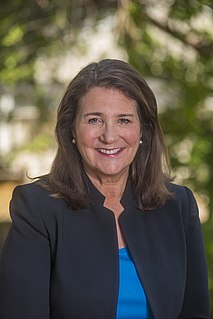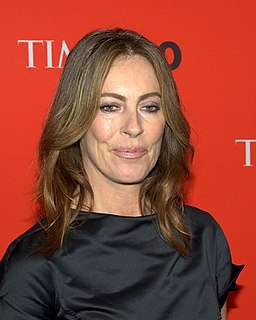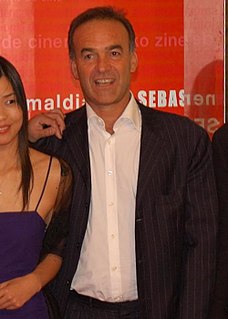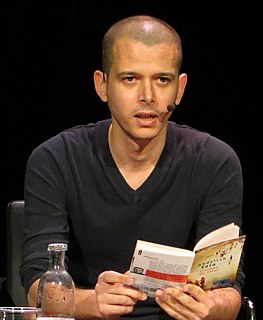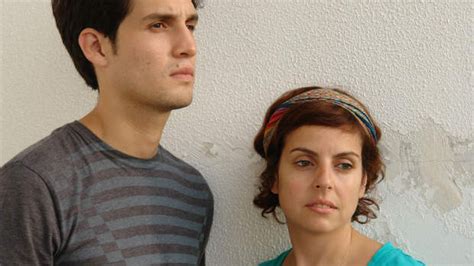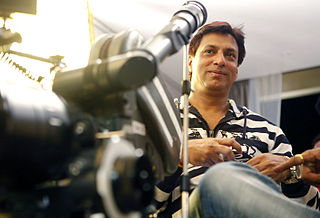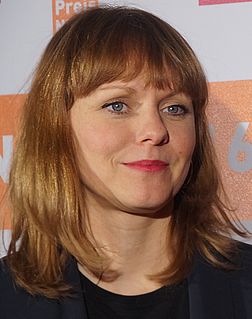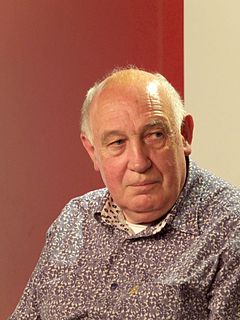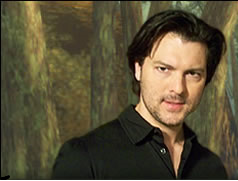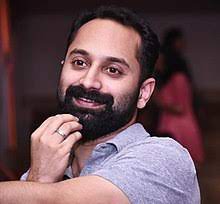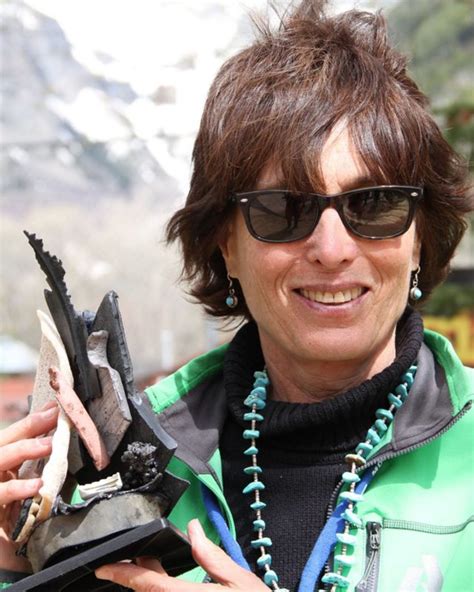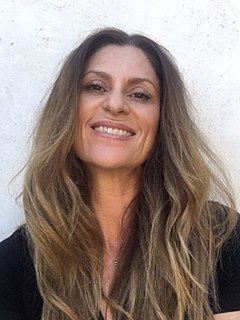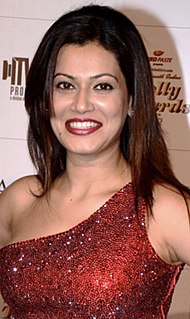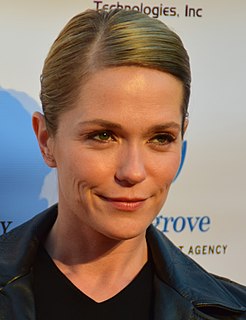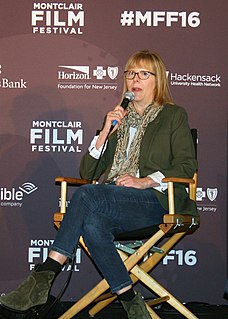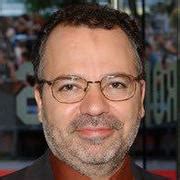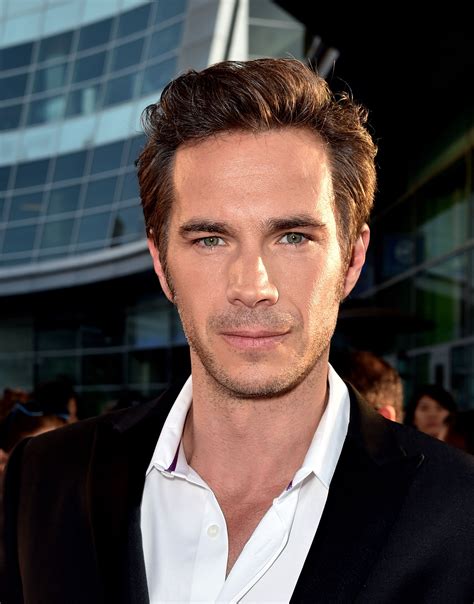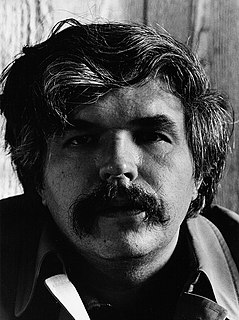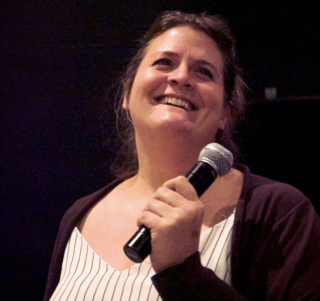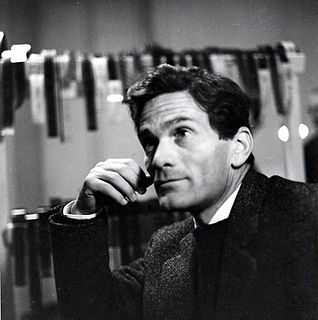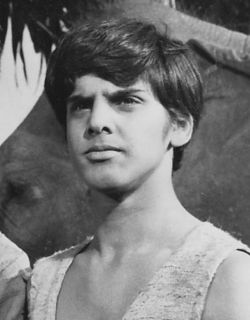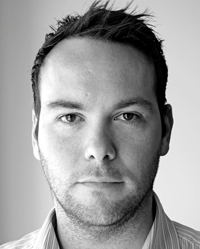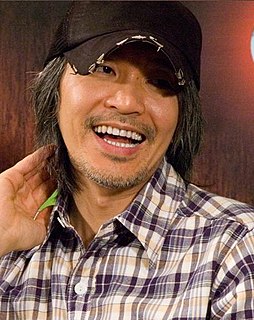Top 1152 Filmmaker Quotes & Sayings - Page 18
Explore popular Filmmaker quotes.
Last updated on December 22, 2024.
It's probably unprecedented for a filmmaker simply to take the writers' script and treat it as the instructions on the package. What really happens is you pretty much suppress your own instincts - and your own views on the matter - and write things the way filmmakers would like to have them, though the filmmakers often don't know what they want. They can only find out by reading what you do.
You know, 'Top Gun' was the movie I saw in high school that made me want to be a filmmaker. I remember very specifically coming out of the Century 21 Theater in Colorado from seeing it, and my friend saying, 'What did you think of the movie?' And I said, 'I think I know what I want to do for a living.' That's a true story.
We became a congresswoman, a stay-at-home mom, a filmmaker, and a journalist. And Lino and I taught our children that they could rise to even greater heights. They could become surgeons, CEOs, supreme court justices, secretary of state, and even president of the United States. We didn't teach our daughters that they were second-class citizens.
I'm quite curious and excited about seeing a new script for 'Blade Runner.' If, in fact, the opportunity would exist to do another, if it's a good script, I would be very anxious to work with Ridley Scott again; he's a very talented and passionate filmmaker. And I think it would be very interesting to revisit the character.
I studied law before I became a filmmaker, and I actually have a great belief in the justice system and the rule of law. I think it's the thing that separates us from animals. I really believe in the rule of law because it's an attempt to bring rational accountability to human behavior, which has a great capability of becoming irrational.
As a Black woman filmmaker I feel that’s my job: visibility. And my preference within that job is Black subjectivity. Meaning I’m interested in the lives of Black folk as the subject. Not the predicate, not the tangent.[These stories] deserve to be told. Not as sociology, not as spectacle, not as a singular event that happens every so often, but regularly and purposefully as truth and as art on an ongoing basis, as do the stories of all the women you love.
I started to write because of my dream to become a filmmaker. I got to know about a film school in Paris and it was my goal to get there. To do that I knew I had to learn French. In order to practice I started to write journals in French. The effort I made to master what I regarded a bad thing - a language owned by the rich Moroccans - brought me the ability to write.
When you do these things, you sort of take the journey. The journey is all about how I can interweave the Oscar Wilde story, the story of Salome, the play itself and what it is, what it contains, and my journey as an actor, as a director, as a filmmaker, as a person struggling with whatever I'm struggling with - my own celebrity, my own life. This is semi-autobiographical in terms of my commitment to this kind of thing.
I come from a documentary background and my natural tendency, as a filmmaker, is to make a movie, if I have something to talk about. If it's not about anything that matters, I don't feel like doing it. I'm not against people who make movies just for fun, but I'm not one of those guys. I just want to provoke thinking and debating about certain issues.
There's no reason not to employ, seek out and take a chance on a woman filmmaker that you might not have been looking at her direction. She's not done it before because you've not given her the opportunity to do it before, and I'm just happy that folks like Jessica Jones' Melissa Rosenberg and folks like Ryan Murphy are also embracing this idea.
A lot of what I know as a filmmaker is because of hockey. That's teamwork, and being able to collaborate with people, and be creative with them, and get the most out of everybody. Everyone's got different talents, and you've got to bring out the best of everybody, and use your strengths and work together, and try and evolve it rather than do what was done before you, and to push into new areas.
To seek out making films that are unique and insightful, boundary-pushing and genre-bending, and not films that fit into the neat, little boxes that people "want" (expect) women to be making. In some ways, I guess for me, any filmmaker should strive to be a good director first, regardless of their gender, race, sexual orientation etc.
We with Komplizen Film believe very much in the writer-director and in the freedom of a filmmaker. I think it's always good to be involved where you spend the money. Filmmaking, you see in the picture what the money's spent for. I never had to leave a phase of filmmaking before being really happy, and that was really a big luxury. That could happen, I think, because I am my own producer.
It really depends on what the screenplay is asking of you, and what your responsibility is to that character. You have the author's intent to deal with, you have the filmmaker's vision, and then you have your own wants, desires and needs for the character. It's collaborative. But I knew, right off the bat, that there was no way to go into some sort of pink-haired, clown-nosed character with Ronald McDonald shoes.
I think people go to the movies to be entertained, to have an experience, to disappear from their own reality for a couple of hours. If the film truly succeeds in everything the filmmaker sets out for it to be, then it's elevated to art. It's elevated to something special, because it gives people a visceral feeling of something they're experiencing as a collective group. You feel something and that's what turns it into what you may call art.
I love acting. I think that's the best job in the world, but I don't really enjoy the career of it so much. You don't have as much control over your life or the material as you do, well, certainly when you're a director or a producer, so while I love acting, I prefer to make my living as a filmmaker, but my rule on acting is if somebody asks me to do a part, I'll do it.
You can probably ask any actor: every time you start a new film, it's literally like your first movie. Everyone, regardless of the filmmaker being a debutant or a veteran, takes their time to settle down when you begin the shoot together. It's like all of us have moved into a new house, and we are setting up the place.
[Having bigger budget] allowed me to be a full-time filmmaker for a couple months and not have to have a day job and be balancing a bunch of other stuff. It allowed me to bring in all these people from different parts of the country. It allows me to have an actual food budget, where we could eat healthy for the month we were shooting. It makes all the difference in the world.
You have to believe in yourself and always strive for the best. Whether that is getting the best actor, the most talented cinematographer, or the best location for your story, you have to have the hunger to want it and be willing to do what it takes to get it. A filmmaker should never be satisfied with their work. There should always be something that they want to improve on.
If you have to become a filmmaker, find a story that takes you away, and tell that story. Don't think about whether it's going to sell, or whether it's going to make money, or whether it's going to appeal to distributors. Do something from the heart that really matters, and then you'll do something good.
There was one moment, and it happened in school. I had a big final exam - we were supposed to write a 20-page report on this book about Houdini. I probably would have loved reading it, but I didn't, so I just decided to make a little super-8 movie based on it. I tied myself to the railroad tracks and all that. I mean, this is kid stuff, but it impressed the teacher, and I got an A. And that was maybe my first turning point, when I said, 'Yeah, I wouldn't mind being a filmmaker.'
I don't see myself as a crusading feminist filmmaker. Not at all. I have the luxury of coming from New Zealand and I've had moments in my life where being female is considered to be a tremendous advantage - emotionally, career-wise. Personally, I have nothing to prove. But I'm tremendously curious about human nature. Female life is so incredibly underexplored in cinema, so these stories feel very exotic.
Just because of the #MeToo movement in Hollywood, after Oscar-winning actresses including Angelina Jolie came out and spoke against Harvey Weinstein, we also want to talk about something that has been happening in Bollywood for long; like several years ago, Mamta Kulkarni had spoken against filmmaker Rajkumar Santoshi.
I'd like to make mistakes on my own dime, and not have a herd of people tell me what I'm doing wrong. and I'm also still trying to find and develop my voice as a filmmaker, and I think that's easier to do on your own terms, than trying to satisfy a bunch of people that are paying for the movie. That being said, I'm certainly open to moving into that world.
We didn't set out to make some polemic about life in the digital age, I can only react emotionally to story ideas. You hear an idea and you go, 'That's cool. I can see spending a few years of my life working on that.' As a filmmaker, you approach it like, 'OK. They're going to give you all this money to make this movie. It's like an electric train set you get to play with.'
I would hate to say as a non-African-American person that it would be wrong for a black person to direct white people in a movie. Wouldn't that be awful of me to say that? The only sympathizing thing I might say for people that want to [grumble] is that a filmmaker should have an understanding for the place where the people you're portraying are coming from.
I know that Madonna is not a first-time filmmaker, but I have worked with a lot of first time filmmakers and I have worked with a lot of inexperienced film directors so that never has particularly worried me - I find it quite exciting - but I have never worked with a director who has had so little experience of directing who was so prepared.
Without a doubt, I was born to want to make cinema, but the kind of cinema I want to make is not like commercial movies, which I enjoy myself, but I wanted to be the kind of filmmaker who wrote original work, sort of like a novelist would who deals with who we are and our times or our relationships.
Peter Kubelka is the perfectionist of the film medium; and, as I honor that quality above all others at this time finding such a lack of it now elsewhere, I would simply like to say: Peter Kubelka is the world's greatest filmmaker - which is to say, simply: see his films!...by all means/above all else...etcetera.
There is something that might be called cinematic beauty. It can only be expressed in a film, and it must be present for that film to be a moving work. When it is very well expressed, one experiences a particularly deep emotion while watching that film. I believe that it is this quality that draws people to come and see a film, and that it is the hope of attaining this quality that inspires the filmmaker to make his film in the first place.
I have received the digital camera as a blessing. It has really changed my life as a filmmaker, because I don't use my camera anymore as a camera. I don't feel it as a camera. I feel it as a friend, as something that doesn't make an impression on people, that doesn't make them feel uncomfortable, and that is completely forgotten in my way of approaching life and people and film.
I think that until a filmmaker knows that about him- or herself, the films they make will just be copies of other people's work. It's important for anyone who wants to make films for a living, but I think perhaps it has an even greater weight for female filmmakers since they represent a much smaller percentage of the population. Their voices are fewer so they must be even stronger.
I am an emotional and fragile person. I observe life, I am perceptive and can read a person's body language. I have a strong journalistic streak in me, and had I not been a filmmaker, I would have become a film journalist. I have combined my perceptive and journalistic traits to create my own brand of cinema.
It has been said that I have three heroes: Christ, Marx and Freud. This is reducing everything to formulae. In truth, my only hero is Reality. If I have chosen to be a filmmaker as well as a writer it is because, rather than expressing reality through those symbols that are words, I have preferred the cinema as a means of expression - to express reality through reality.
I was being generous. Gia Coppola wasn't even a filmmaker at that time, but I asked her to do it, because I believed in her as an artist. And because I wanted a woman's take on the material. The book Palo Alto is very male-centric, but Gia carved out a bunch of the female characters, and brought them to the fore in the movie. And the project was richer for it.
When I make film music, I'm a filmmaker first and foremost. It's about serving the needs of the film. You're telling a story; in a way, you stop becoming a composer and become a storyteller instead. You tell the story with the most appropriate themes. How you approach these things is a very personal matter, but your goal is to tell the story first.
The best thing you can do with actors is collaborate with them. My job is to inspire them to give their best. And they're only inspired if they feel they are part of the creative process, otherwise they'll shut down. So my goal is always to ask people what they would like to do before I even say my opinion. I usually don't know anything until I see it. I'm a fetish filmmaker - I make films based on what I want to see.
I do some freelance web design stuff. I taught a directing class for this not-for-profit organization here in Chicago a couple months ago. I wrote a thing for Filmmaker Magazine a couple months ago. Occasionally, I'll get to go speak to students at a university and make a little money that way, which is great. I really like doing that.
In some ways a mark of good parenting is that you don't try to make your children into little knockoffs of yourself. None of us went into business. None of us became powerful people like that. All of us pursued our own passions and our own interests. One of my brothers was filmmaker. One of my brothers was a teacher. My sister was a librarian.
I needed to do a lot of saying no. I had a lot of [interest] from people who I just didn't think were quite right for it. And I didn't want a bad film to be made of the book, either a sentimental one or a creepy one, so I did a lot of, "No thank you." Then when the right filmmaker came along, yes, I suppose I presented myself very much as wanting to be the writer.



